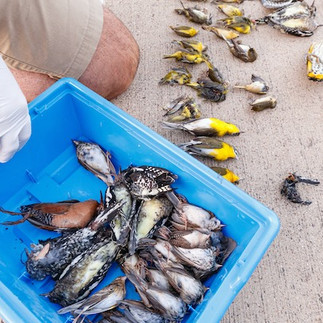Take Action for Wildlife! TCA Begins Lights Out Fort Worth Surveys
- TexasConservationAlliance
- Mar 30, 2023
- 3 min read
Updated: Mar 31, 2023
Texas Conservation Alliance is excited to announce the first downtown surveys in Fort Worth looking for migratory birds that have collided with windows.

These surveys are an extension of our work in downtown Dallas, where TCA has conducted Lights Out surveys since 2020. We look for birds that have collided with windows to learn more about how light pollution can attract and disorient birds from their migratory routes, causing them to collide with lit buildings.
Collision victims are delivered to the Biodiversity Research and Teaching Collections (BRTC) at Texas A&M College Station, where researchers are learning more about bird migration in Texas. TCA also rescues birds that were stunned or injured by window collisions.
More than 1 in 3 migratory birds travel through Texas, so it is important to preserve key migratory routes and understand more about these species. Our work has motivated cities like Dallas, Fort Worth, and Austin to go #LightsOutForWildlife.
When: April 1-May 31, 6:00 AM - 8:00 AM, rain or shine
Where: Surveys begin and end at the Tarrant County College Trinity River East Campus Parking Lot in Fort Worth.
How to get involved: To help with surveys, fill out the interest form below. New volunteers must fill out the 2023 TCA Volunteer Liability Waiver and can review the volunteer guide here. Once you are registered with us, join us on mornings in April and May at the TCC parking lot in Fort Worth. No RSVPs are required!
Interest form: https://forms.gle/bij9xcFVJEKets6V6
Parking: TCC Trinity River East Campus (TREC) Parking Lot: 401 E Belknap St, Fort Worth, TX 76102.
A Parking Permit is required to park in the TREC Parking Lot, which will be provided for you on arrival. Please park in the white parking spaces designated for students.

Please enter through E Belknap St or N Grove St.
We will try to park together in the area denoted by the yellow star in Lot A, although you can park in any of the white spaces designated for students in Lots A or B. It helps to park close together to coordinate and locate all volunteers before we leave on our route early in the morning.
Lights Out Fort Worth Coordinators will give you a parking permit to be placed on the dashboard of your car when you arrive.
Thank you to Tarrant County College for supporting Lights Out Fort Worth and providing us with parking for Spring 2023!
What to bring:
A flashlight or headlamp
Weather-appropriate clothing
Comfortable walking shoes
Main contacts: Lights Out Fort Worth surveys are led by coordinator Mariah Campos (mariah@tcatexas.org) and assistant coordinator Madison Gover (madison.gover@yahoo.com).
More ways to help: If you are unable to assist with surveys this spring, you can still make a difference for migrating birds in your own home by turning out unnecessary lights from 11:00 PM to 6:00 AM during peak migration seasons, March-May and September-November.
Certify your household, business, or place of worship as Lights Out for Wildlife friendly for free at www.tcatexas.org/lights-out-for-wildlife.
Join our Lights Out mailing list:
Sign up to receive quarterly email updates about TCA's Lights Out programs in Dallas and Fort Worth. Click here.
Thanks to our partners!
Special thanks go to the Amon G. Carter Foundation for supporting the Lights Out Fort Worth program and our Lights Out Fort Worth partners at the Fort Worth Museum of Science and History, Tarrant County College Trinity River Campus, and Downtown Fort Worth Inc.
The Cornell Lab of Ornithology launched the Lights Out Fort Worth campaign in 2020, including coordinating with local media and working with downtown buildings to encourage participation in Lights Out Texas. We are grateful for their work and to Cornell University and Oklahoma State University for designing the Lights Out Texas survey protocol.
We are also grateful to our Lights Out Dallas partners who helped make Lights Out Fort Worth surveys possible, including Audubon Texas, Dallas Zoo, Trinity River Audubon Center, Perot Museum, North Texas and Blackland Prairie Master Naturalists, the Cornell Lab of Ornithology, and Biodiversity Research and Teaching Collections.
Migration is the most hazardous time for birds. By darkening the night sky for birds, we can take action and save wildlife!





